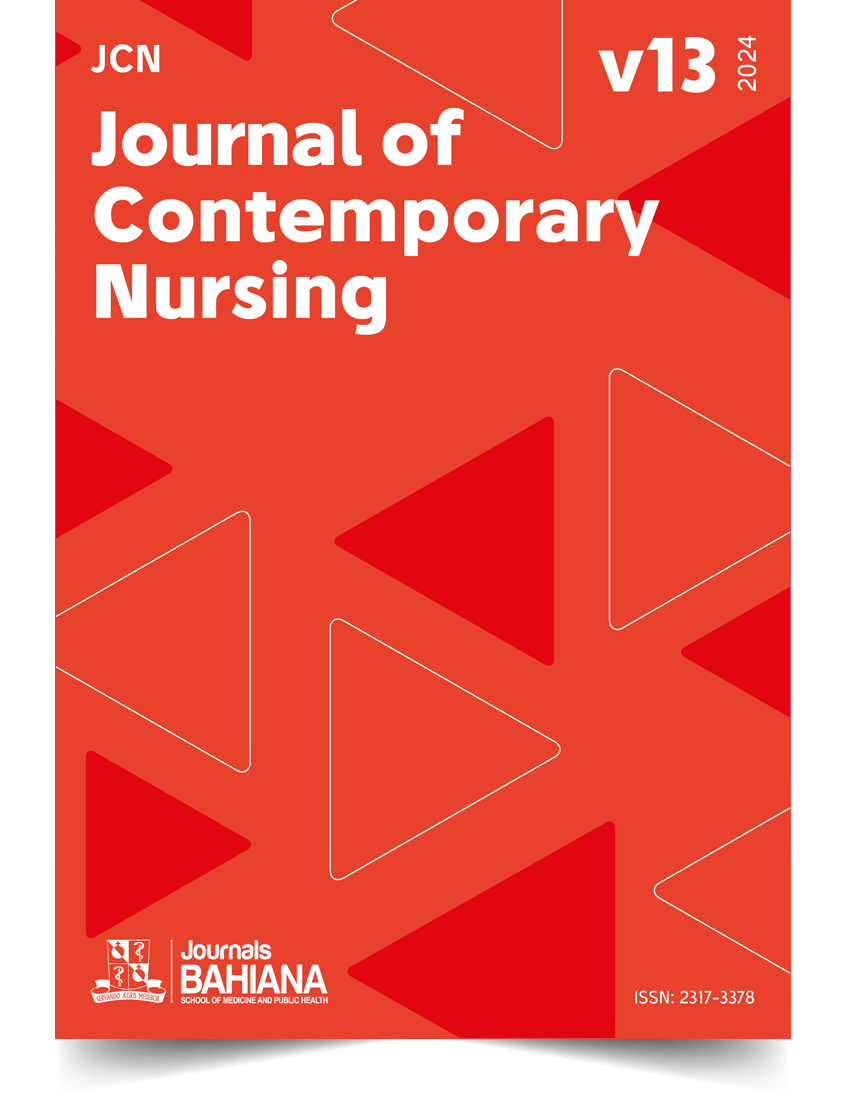Emotional (un)availability in the face of neonatal death in a nursing team
DOI:
https://doi.org/10.17267/2317-3378rec.2024.e5824Keywords:
Neonatal Death, Nursing, Neonatal ICUAbstract
OBJECTIVES: Investigate the possible emotional impacts that neonatal death causes on nursing professionals working in a Neonatal ICU. Additionally, the study aimed to understand the coping strategies these professionals use when dealing with cases of neonatal death. METHOD: Exploratory qualitative study carried out with five healthcare professionals: two nurses and three nursing technicians, from a team in the Neonatal ICU of a private hospital in a city in the countryside of Rio Grande do Sul, Brazil. Data were collected through the focus group technique, whose transcriptions were analyzed using Content Analysis. RESULTS: An analysis theme called emotional (un)availability was organized, which included feelings and emotions with a predominance of sadness, frustration and helplessness, mainly related to the bond established with the patient, the families, and the insufficiency in training to cope with these situations. The main management strategies vary among silence, anger, psychological support or the maintenance of the work routine. FINAL CONSIDERATIONS: We observed that negative feelings and emotions were predominant when dealing with death, leading professionals many times to adopt reactions of emotional unavailability due to the problem.
Downloads
References
(1) Papalia DE, Olds SW, Feldman RD. Desenvolvimento humano. 12th ed. Porto Alegre: Artmed; 2013.
(2) Kovacs MJ. Morte e desenvolvimento humano. 5th ed. São Paulo: Casa do Psicólogo; 2010.
(3) Iaconelli V. Manifesto antimaternalista. Rio de Janeiro: Zahar; 2023.
(4) Fernández-Sola C, Camacho-Ávila M, Hernández-Padilla JM, Fernández-Medina IM, Jiménez-López FR, Hernández-Sánchez E, et al. Impact of perinatal death on the social and family context of the parents. Int J Environ Res Public Health. 2020;17(10):3421. https://doi.org/10.3390/ijerph17103421 DOI: https://doi.org/10.3390/ijerph17103421
(5) Gonçalves LB, Carletto MR, Ivastcheschen T, Oliveira BPK. Maternal feelings in face of perinatal death. Rev Pesqui. 2021;13:1493-8. https://doi.org/10.9789/2175-5361.rpcfo.v13.10213 DOI: https://doi.org/10.9789/2175-5361.rpcfo.v13.10213
(6) Prezotto KH, Bortolato-Major C, Moreira RC, Oliveira RR, Melo EC, Silva FRT, et al. Early and late neonatal mortality: preventable causes and trends in Brazilian regions. Acta Paul Enferm. 2023;36:eAPE02322. https://doi.org/10.37689/acta-ape/2023AO02322 DOI: https://doi.org/10.37689/acta-ape/2023AO02322
(7) Ministério da Saúde. Portaria nº 930, de 10 de maio de 2012. Define as diretrizes e objetivos para a organização da atenção integral e humanizada ao recém-nascido grave ou potencialmente grave e os critérios de classificação e habilitação de leitos de unidade neonatal no âmbito do Sistema Único de Saúde (SUS). [Internet]. Diário Oficial da União. 2012. Available from: https://bvsms.saude.gov.br/bvs/saudelegis/gm/2012/prt0930_10_05_2012.html
(8) Lima GR, Silva JSLG. Vivência dos profissionais de enfermagem perante a morte neonatal. Rev Pró-UniverSUS. 2019;10(1):38-41. https://doi.org/10.21727/rpu.v10i1.1607 DOI: https://doi.org/10.21727/rpu.v10i1.1607
(9) Fernandes VD, Sá Neto JA, Coutinho KAA, Reis AT, Silva ACSS. Nursing team's conceptions about palliative care in newborns. Rev Enferm UERJ. 2021;29(1):e57257. https://doi.org/10.12957/reuerj.2021.57257 DOI: https://doi.org/10.12957/reuerj.2021.57257
(10) Vasconcelos LMR, Dutra EMS. The Feelings Of Health Professionals About The Death Of Newborns [Internet]. Rev NUFEN. 2020;12(3):38-52. Available from: https://pepsic.bvsalud.org/scielo.php?script=sci_arttext&pid=S2175-25912020000300004
(11) Gil AC. Métodos e técnicas de pesquisa social. 7th ed. São Paulo: Atlas; 2019.
(12) Bardin L. Análise de conteúdo. 70th ed. Lisboa: Edições 70; 2016.
(13) Zenevicz LT, Bitencourt JV, Léo MMF, Madureira VSF, Thofehrn MB, Conceição VM. Permission for departing: spiritual nursing care in human finitude. Rev Bras Enferm. 2020;73(3):e20180622. https://doi.org/10.1590/0034-7167-2018-0622 DOI: https://doi.org/10.1590/0034-7167-2018-0622
(14) Silva BLP, Lira BA, Kintschev K, Lopes ZA. Death and the practice of health professionals: contributions from the theory of social representations. Res Soc Dev. 2022;11(17):e38840. https://doi.org/10.33448/rsd-v11i17.38840 DOI: https://doi.org/10.33448/rsd-v11i17.38840
(15) Salbego C, Nietsche EA, Pacheco TF, Cogo SB, Santos AO, Kohlrausch LF, Ramos TK. O processo de morte e morrer na percepção de acadêmicos de enfermagem. Rev Enferm Atual In Derme. 2022;96(38):e021250. https://doi.org/10.31011/reaid-2022-v.96-n.38-art.1355 DOI: https://doi.org/10.31011/reaid-2022-v.96-n.38-art.1355
(16) Silva RKB, Vale JS, Gomes KRB. O preparo do enfermeiro diante da morte e do morrer [Internet]. Rev Cient Fac Educ Meio Ambiente. 2020;10:90-4. Available from: https://revista.unifaema.edu.br/index.php/Revista-FAEMA/article/view/1127
(17) Paulino M. Luto: Manual de intervenção psicológica. 1st ed. Rio de Janeiro: Pactor; 2021.
(18) Kübler-Ross E. Sobre a morte e o morrer. 4th ed. São Paulo: Martins Fontes; 2016.
(19) Mattei LT, Gil PHC. Experiences and perceptions on neonatal and fetal mortality of a nursing team at a public hospital in the interior of Rio Grande do Sul. REAS. 2024;7:e17309. https://doi.org/10.25248/reas.e17309.2024 DOI: https://doi.org/10.25248/reas.e17309.2024
Downloads
Published
Issue
Section
License
Copyright (c) 2024 Grasiele Correa Dalazen, Pedro Henrique Conte Gil

This work is licensed under a Creative Commons Attribution 4.0 International License.
This work is licensed under a Creative Commons Attribution 4.0 International License.



